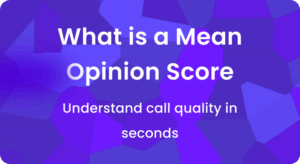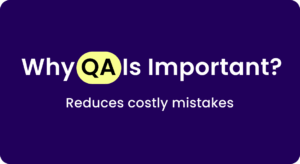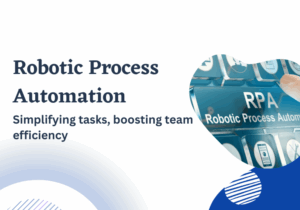Wondering what are some top sought-after tools to try in 2025? Let’s explore!
Let’s face it – you’ve gotten a message from a family member on WhatsApp that says, “Hey, we need to talk about something later.”
The text seemed quite general, and you couldn’t understand the tone and emotion behind it.
Is it romantic or sweet, or is there a hint of frustration? You had no idea.
Not understanding the message’s sentiment can significantly affect how you respond and connect.
Now, think about this scenario for your business.
You want to know what people think of your brand. You’re analyzing customer feedback but can’t grasp the message’s intent.
With a lot of customer text about your brand, it’s hard to manually sift through all those mentions.
That’s where sentiment analysis tools come into play.
These tools help you interpret the tone and intent behind the words.
Your business must respond to feedback. It is vital for growth and customer satisfaction.
According to Bain & Company, “54% of companies stated that they had adopted the technologies analyzing customers’ sentiment from their reviews or social media in 2020, which is expected to exceed 80% in 2023.”
In the blog post, we’ll discover sentiment analysis tools and a list of the most popular tools available.
How we analyze and select Sentiment Analysis Tools?
We have compiled the following list of 12 sentiment analysis tools through extensive research and evaluation. Our process involved actively weighing factors like user experience, G2 ratings and reviews, cost, and scalability.
We assessed the proficiency of these tools in sales coaching, training, lead management, quality assurance and feebacks.
Our goal is to give marketers helpful information so they can pick the best tools to make their businesses grow.
A. What is sentiment analysis?
Sentiment analysis tools use natural language processing (NLP) to analyse text data, determining the emotional tone behind it. These tools help businesses understand customer opinions, feedback and trends for customer sentiment and decision making.
This can include identifying whether a given text is positive, negative, or neutral.
Sentiment analysis tools give insights into customer feedback and social media. They analyze chat messages and emails, too.
B. Best sentiment analysis tools to try in 2025
1. Enthu.AI
Enthu.AI is one of the best conversation intelligence software that offers sentiment analysis through state-of-the-art machine learning and AI algorithms.
With this tool, you can automatically capture customer voices across phone calls, chats, tickets, VCs, and other channels and understand the emotion and intent behind those voices.
Enthu.AI sentiment analysis feature helps you assess the number of positive, negative, and neutral sentiments through text messages.
Also, this super easy-to-use software clearly understands your customer’s feelings and thoughts during live calls.
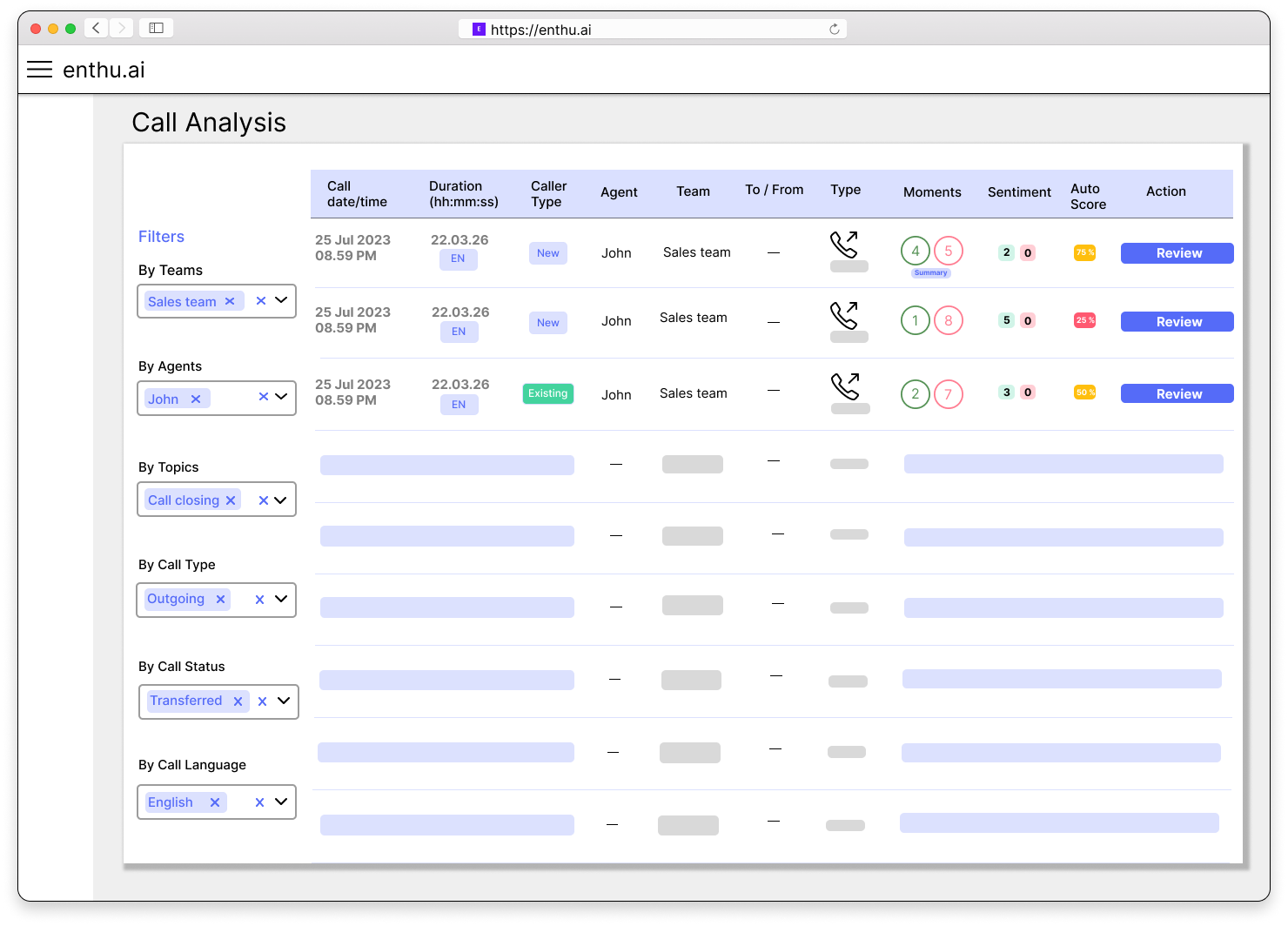
On top of call center sentiment analysis, it automates quality call monitoring with a remarkable boost in quality assurance efficiency.
Moreover, it brings the most important insights of your customers, making your contact center run efficiently and consistently.
So, you can be super efficient and make your customers happier all the time.

The interface looks nice. Integrations are ready quickly. Have low costs, great monthly subscription. Best call transcription with analysis! Responsive team. Highly recommend!
Alex McConville
Head of Central Sales

Enthu. AI is an amazing and flexible conversational intelligence with strong integration capabilities. Provides high level of accuracy on call transcript and has strong word recognition.
Scott Bierbryer
Chief Revenue Officer
Best For:
- Use cases supported: Quality assurance, agency coaching, process improvement, customer experience.
- G2 Rating: 4.9 out of 5
- Languages supported: German, English, French, Spanish
- Key features: Top accuracy, 100% call coverage, agent-wise analysis, custom call moments, custom evaluation forms.
- Pricing: Custom
2. Idiomatic

Idiomatic’s sentiment analysis software can find your customers’ pain points, sentiments, and drivers. It works across sources like app reviews and support tickets.
It classifies millions of your customers’ comments in minutes. It gives a clear view of customer sentiment. Use this to improve your products, services, or operations.
Also, its report builder feature allows you to create and share custom reports easily.
Also, Idiomatic enables quick analysis through keyword search. It ensures real-time integration of labels and sentiments into helpdesk systems.
This helps you address high-priority issues promptly and reduce customer churn.
- Primary Use Case: Customer feedback analysis and quality assurance in customer support.
- Pricing: Starts at $399/month per simple data source. (Visit the contact page to know more)
- G2 Reviews: 4.8/5 (link to customer reviews)
Best For
3. Reputation

The next sentiment analysis software in our list is Reputation.
Reputation uses Natural Language Processing to understand how people see your brand.
Its advanced features help you understand customers’ feedback by topic. They include competitive reporting, a reputation score, sentiment maps, and feedback categorization.
- Primary Use Case: Survey building, reviews booster, and sentiment analysis.
- G2 Reviews: 4.5/5 based on user reviews. (link to customer reviews)
Best for
4. Repustate

With a click, you can analyze your customers’ insights from various sources, like videos, social media, and surveys.
And the best part is that no coding or training is required. The tools’ highly scalable API analyzes 1,000 comments per second, delivering the data you need faster than ever.
Repustake’s features improve your understanding of customers. They include: semantic search, text analytics, named entity recognition, and video analysis.
Eventually, you can attract and retain the best customers, deliver better products and services, and grow your business.
- Primary Use Case: Global sentiment analysis.
- G2 Reviews: N/A.
5. Brand24

Brand24 is a versatile brand monitoring tool. It helps you track what people say about your brand online.
This software uses AI, machine learning, and NLP. It gathers your brand mentions from 25 million sources in real-time
Brand24 has features like sentiment analysis, hashtag tracking, and customer insights. It lets you check if mentions are positive, negative, or neutral.
It helps you measure brand awareness and understand customers’ views. It also helps you stay ahead of the competition.
Trusted by over 4,000 brands worldwide, Brand24 ensures you never miss a crucial mention.
It offers the tools to succeed in online brand management, for any business, big or small.
- Primary Use Case: Social media monitoring and sentiment tracking.
- G2 Reviews: 4.6/5 based on user reviews. (link to customer reviews)
Best for
6. Meltwater

Many global brands trust Meltwater. It is a reliable sentiment analysis tool. It helps you navigate the complexities of sentiment analysis and media monitoring.
Meltwater’s AI tools help you find consumer data. So, you can get insights for better decisions.
Meltwater’s tools, including Media Intelligence and Social Listening, help users understand audience sentiments and market trends.
The platform lets you monitor brand mentions, analyze social media, and gain insights into consumer behavior.
Also, Meltwater’s real-time alerts and sentiment analysis enable quick decisions. Its solutions cover various channels.
This ensures agility in adapting to diverse business needs.
- Primary Use Case: Media sentiment tracking.
- G2 Reviews: 4.0/5 based on user reviews. (link to customer reviews)
Best for
7. Lexalytics

Lexalytics has crafted a full suite of NLP and sentiment analysis software for you.
After 19 years of work, Lexalytics has the most complete NLP stack. It covers sentiment analysis, categorization, entity extraction, and intention detection.
The tool offers flexible deployment options, making integration into your setups seamless.
It is specifically designed for data scientists and architects.
Tailored configurations for hotels, restaurants, retail, pharma, and employee feedback ensure immediate enhancements in sentiment accuracy straight out of the box.
You can also easily configure, tune, and deploy custom machine-learning models to solve your unique data challenges.
Lexalytics doesn’t just tell you how customers feel. It also reveals why they feel that way.
- Primary Use Case: Industry-specific sentiment analysis and robotic process automation.
- G2 Reviews: 4.3/5 based on user reviews. (link to customer reviews)
Best for
8. SentiSum

Experience fast sentiment analysis with Sentisum. It auto-analyzes and tags your customer conversations.
It provides insights on sentiment, contact reasons, and more across various channels and languages.
This automated process ensures consistent tagging at scale, empowering you to uncover the real drivers behind NPS, CSAT, and sentiment.
Sentisum helps support teams in real-time. It prioritizes, routes, and escalates customer queries based on sentiment, urgency, and reason for contact.
You’ll love its easy setup, accurate insights, and great support. It’s your go-to for simple but powerful CX decisions.
- Primary Use Case: Customer experience optimization.
- G2 Reviews: 4.8/5 based on user reviews. (link to customer reviews)
Best For
9. Brandwatch

With Brandwatch, you can access customer insights from 100 million online sources and over 1.4 trillion posts.
Isn’t it amazing?
With the best AI, Brandwatch is the top consumer research tool. It sifts through vast data to find insights you might have missed.
It simplifies complex data analysis. It features Iris for trend spotting, image analysis, custom classifiers, and an AI search.
Brandwatch uses the world’s largest consumer opinion archive. It helps you quickly understand big moments for better decision-making.
With its flexible UI, shared insights, and connected solutions, you can make sentiment analysis accessible and powerful for your needs.
- Primary Use Case: Consumer research and brand & social media management.
- G2 Reviews: 4.4/5 based on user reviews. (link to customer reviews)
Best for
10. CallRail

CallRail’s Premium speech analytics software offers AI-driven call insights for accurate and actionable analyses of your conversations.
Understand the success factors in your calls to turn conversations into customers effectively.
Its features automate transcript extraction, highlight keywords, and tag leads. So, your team can focus on closing deals.
Use live call sentiments, time-saving summaries, and auto lead tagging. They will help you have better customer conversations.
Enable your team to optimize marketing and personalize at scale.
- Primary Use Case: Call monitoring for quality assurance.
- G2 Reviews: 4.6/5 based on user reviews. (link to customer reviews)
Best for
11. Sentiment Analyzer

Last but not least, this free sentiment analysis software allows you to assess any English text’s overall sentiment or emotional tone.
It computes a sentiment score ranging from -100 (very negative) to +100 (very positive).
Trained on over 8,000 samples from the American National Corpus, it worked well with American English after 1990.
It offers general-purpose sentiment analysis for various domains. However, it’s tough due to the subjectivity of human emotions.
It has an 80% agreement rate on sentiment conclusions, vs. humans. So, despite some disagreements, it offers valuable insights.
- Primary Use Case: General sentiment analysis.
- G2 Reviews: NA.
Conclusion
So these are some of the many popular Sentiment analysis tools you should try in 2025.
Each tool on our list has unique strengths. The best choice depends on your business’s needs and focus.
Choose a tool that aligns with your business needs, considering factors like accuracy, customization, and pricing.
These sentiment analysis software help you proactively shape positive customer experiences, drive growth, and stay ahead in an ever-competitive market.
FAQs
1. What is a sentiment analysis tool?
A sentiment analysis tool uses NLP to analyze a text’s emotional tone. It categorizes the tone as positive, negative, or neutral. This helps understand public opinion or feedback.
2. Can ChatGPT perform sentiment analysis?
No, ChatGPT is not specifically designed for sentiment analysis. It is a conversational AI language model developed by OpenAI. While it can understand and generate human-like text based on input, dedicated sentiment analysis tools or models are recommended for accurate sentiment assessments.
3. Which software is used for sentiment analysis?
Several software tools are used for sentiment analysis including, Enthu.ai, Idiomatic, Reputation, Repustate, Brand24, Meltwater, Lexalytics, SentiSum, Critical Mention, Brandwatch, CallRail, Sentiment Analyzer. These tools leverage natural language processing techniques to analyze and classify sentiments in text.
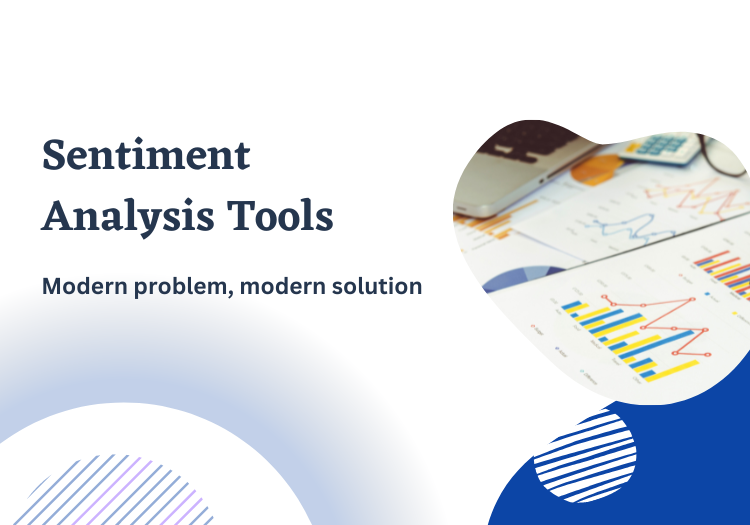

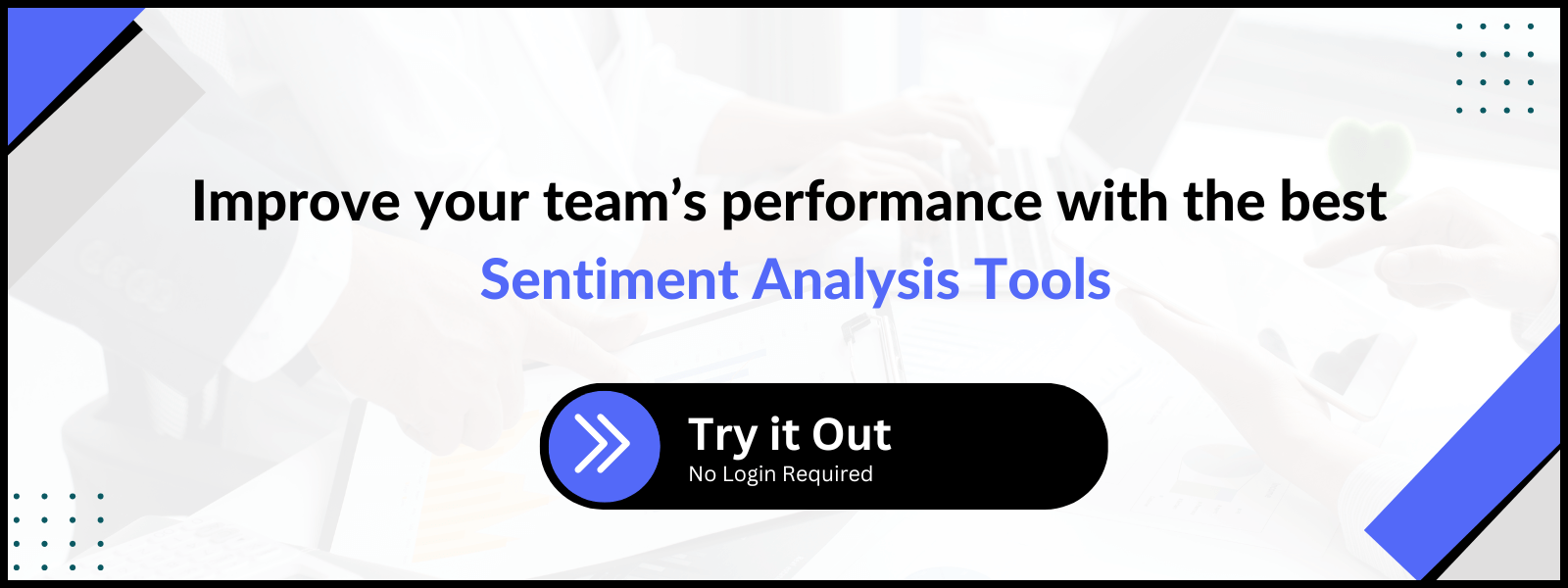


 On this page
On this page
